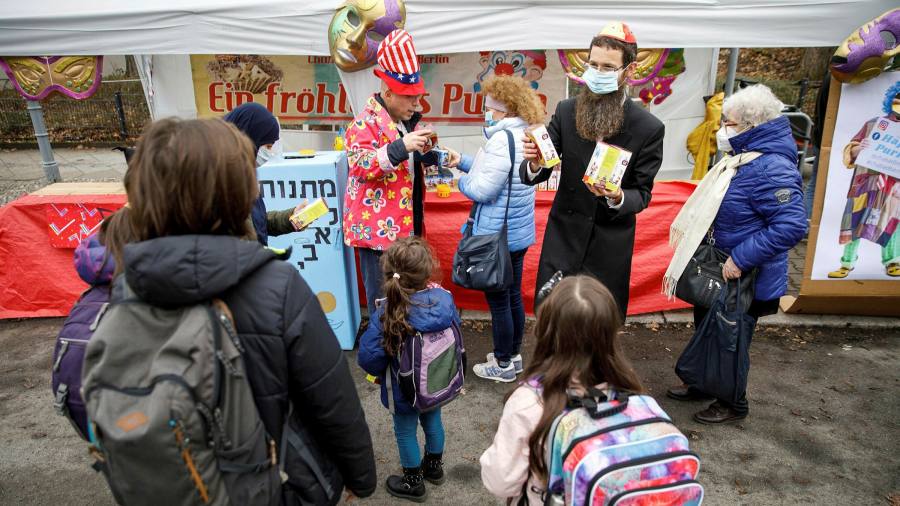[ad_1]
When I first heard about “Meet-a-Jewâ€, it sounded so odd I had to laugh. The project, which arranges meetings between Jewish and non-Jewish Germans, wasn’t something I thought was needed in a country whose historical consciousness is so deeply linked to the Holocaust.
But when I mention the programme to a German friend, she squirms. “Well, you’re the first Jew I ever met,†she says, trying to turn her awkwardness into a joke: “Maybe we’ve focused a little too much on the ones we killed.â€
It’s a reaction familiar to Meet-a-Jew volunteers. “There are still Jews in Germany?†is the most common question Anna Rukhman hears. At school her classmates insisted she didn’t “look Jewishâ€. “I don’t know what they expected,†she laughs. “A yellow star on my jacket?†Anna is one of 350 volunteers who travel the country, offering themselves as personable, ask-me-anything representatives of the 200,000 Jews living in Germany.
The country is rightly lauded for its culture of remembrance of Holocaust crimes, and leaders who vocally condemn anti-Semitism. Yet a focus on the darkest chapter of its past sometimes overshadows Jewish efforts to define themselves in the present. “I don’t want a special role. I don’t want to be handled extra gently because I’m a Jew, as an indirect victim of the Holocaust,†David Blinov, another volunteer, tells me. “I don’t want to be the evil rich Jew either. I just want to be a citizen, living in this country.â€
Germany’s remembrance culture is also struggling with the present. As far-right populists peddle revisionist second world war histories across Europe, some Germans are more openly expressing resentment over collective guilt for past atrocities. A new trend is protesters against vaccines and Covid-19 restrictions comparing their experiences to those of teenage Holocaust victim Anne Frank, or wearing yellow stars like those Nazis once forced on Jews.
Bundestag president Wolfgang Schäuble addressed the problem at a remembrance ceremony last month. “It is devastating to have to admit it: our culture of remembrance provides no protection from blatant attempts to reinterpret or even to deny history,†he said. Some Jewish intellectuals say remembrance culture has become a shield to avoid reckoning with racism. “The calculus I find myself confronted with again and again is: we can’t be racists because we have come to terms with the Holocaust against the Jews,†the playwright Marianna Salzmann said in a 2016 interview.
Anti-Semitic crimes in Germany have risen the last three years, as have assaults on Muslims. One study suggests a quarter of Germans hold anti-Semitic views. Meet-a-Jew, founded in 2020, believes part of the problem is that most Germans simply don’t know any Jews. The programme aims to combat anti-Semitism through personal interaction, but also to portray a Jewish identity that is multi-faceted and goes beyond the Holocaust. Some volunteers are observant, some are secular; they have conflicting views on Israel, but all see themselves as German.
Many such projects have been piloted here in recent years. Before Meet-a-Jew, Berlin’s Jewish Museum had a “Jew in a Boxâ€. There was also a “Happy Hippie Jew Busâ€. The silly names reflect a desire to tell Germans these interactions can be light, maybe even fun.
It’s harder for Meet-a-Jew volunteers in the era of social distancing. At a video conference with students in Stuttgart, volunteers beg shy teenagers to turn on their cameras. Yet somehow it works. Anna and a Muslim student commiserate over racist slurs. Some students venture into the political: How can they criticise Israel without sounding anti-Semitic? (David offers guidelines.) There is a quiz on kosher gummi bears.
Anna believes the only way to get people past preconceptions is to discuss the things they’d be too embarrassed to ask officials. “The beauty of this is people can address us eye to eye.â€
It’s hard to say whether personal encounters can tackle serious societal problems. But at least it’s offering a chance to ask questions without shame. “Can Jews do drugs?†one student asks. I’m not allowed to share their answer.Â
[ad_2]
Source link





